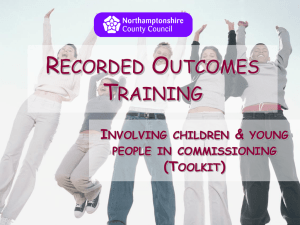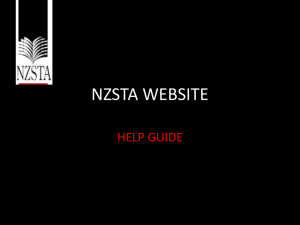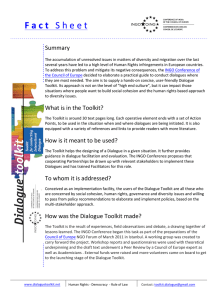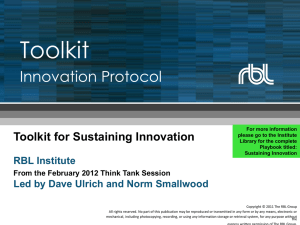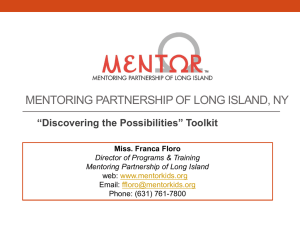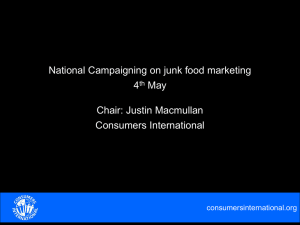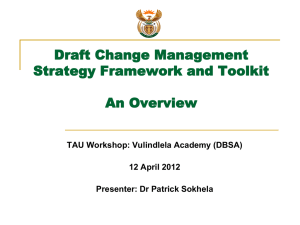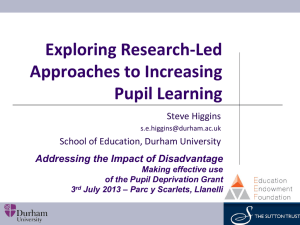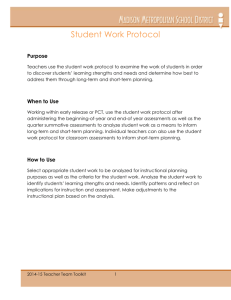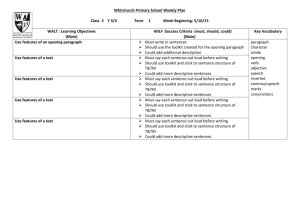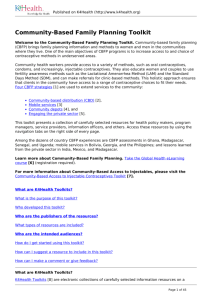KMWG Meeting Notes July 22_Final
advertisement
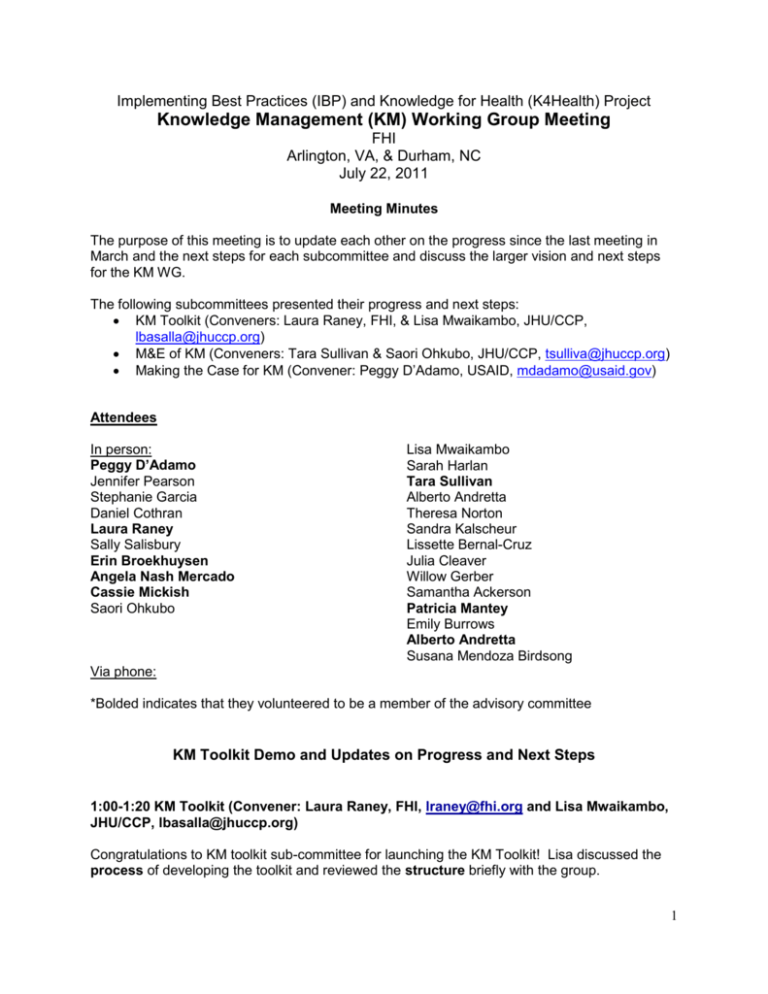
Implementing Best Practices (IBP) and Knowledge for Health (K4Health) Project Knowledge Management (KM) Working Group Meeting FHI Arlington, VA, & Durham, NC July 22, 2011 Meeting Minutes The purpose of this meeting is to update each other on the progress since the last meeting in March and the next steps for each subcommittee and discuss the larger vision and next steps for the KM WG. The following subcommittees presented their progress and next steps: KM Toolkit (Conveners: Laura Raney, FHI, & Lisa Mwaikambo, JHU/CCP, lbasalla@jhuccp.org) M&E of KM (Conveners: Tara Sullivan & Saori Ohkubo, JHU/CCP, tsulliva@jhuccp.org) Making the Case for KM (Convener: Peggy D’Adamo, USAID, mdadamo@usaid.gov) Attendees In person: Peggy D’Adamo Jennifer Pearson Stephanie Garcia Daniel Cothran Laura Raney Sally Salisbury Erin Broekhuysen Angela Nash Mercado Cassie Mickish Saori Ohkubo Lisa Mwaikambo Sarah Harlan Tara Sullivan Alberto Andretta Theresa Norton Sandra Kalscheur Lissette Bernal-Cruz Julia Cleaver Willow Gerber Samantha Ackerson Patricia Mantey Emily Burrows Alberto Andretta Susana Mendoza Birdsong Via phone: *Bolded indicates that they volunteered to be a member of the advisory committee KM Toolkit Demo and Updates on Progress and Next Steps 1:00-1:20 KM Toolkit (Convener: Laura Raney, FHI, lraney@fhi.org and Lisa Mwaikambo, JHU/CCP, lbasalla@jhuccp.org) Congratulations to KM toolkit sub-committee for launching the KM Toolkit! Lisa discussed the process of developing the toolkit and reviewed the structure briefly with the group. 1 After generating the list of questions that the toolkit should answer, the questions were grouped to make logical tabs. The toolkit represents a collaborative effort with 15+ organizations. This version of the toolkit is a beta version; there is a need of more KM tools, especially for implementation in public health; K4Health is working on developing these products and encouraging ongoing contributions to the toolkit. Ideas for the future include a Success Stories tab, KM strategy document, KM audit resource Sarah Harlan and Tara Sullivan will take the lead for version two, focusing on new KM tools. Please contact them if you have suggestions for additional resources. The group discussed the promotion and dissemination of the toolkit, including what has been done so far, and brainstormed additional ideas and channels. P&D efforts so far include: A launch announcement and postcard were sent to relevant listservs, including HIPNET and Planet Wire. Tara Sullivan and Sarah Harlan wrote a blog post on K4Health, “Knowledge Management for Health and Development Toolkit: Why KM Matters” (http://k4health.org/node/628397) RSS feed (http://www.k4health.org/toolkit/618299/feed) Then the group brainstormed ideas for further promotion and dissemination of the toolkit, which included: The Communication Initiative Network Drumbeat (http://www.comminit.com/global/, drumbeat@comminit.com) Peggy is working on sending an announcement out to the USAID mailing list. Laura will send announcement out to FHI 360 field offices with VP’s signature. JSI will disseminate through their network and have AIDSTAR 1 promote too. Lisa will add JSI and SSS names to the list in press release; apologies for this oversight. HIFA 2015 HIPNET library mailing Health Informatics Conference Announcement will be included in weekly IBP Global Community eNewsletter KM M&E Working Group Updates 1:20-2:20 KM M&E (Convener: Tara Sullivan & Saori Ohkubo, JHU/CCP, tsulliva@jhuccp.org & sohkubo@jhuccp.org) Saori gave a brief overview of the purpose and objectives of the KM M&E Working Group: Purpose: Improve design, implementation and measurement of KM programs Objectives: Update Guide to M&E KM programs for health 20+ members Saori then reviewed the group’s progress to date: Developed draft framework/logic model and written description document to elucidate inputs, processes, outputs, and outcomes Teleconferences to discuss/revise framework (now meeting less frequently) Presented to KM WG group and HIPNet and revised based on input 2 Reviewed preliminary list of KM indicators from CAs Shared framework with external reviewers Saori reviewed in detail the most recent version of the Knowledge Management & Exchange (KME) Logic Model: There are 5 elements of KM processes- all KME related activities- Efforts are more effective if all are included/integrated Outputs- stages related to BCC theories (this is the box that has changed the most) o Audiences reached- This goes both ways; there should be two-way communication with audience. o Audiences satisfied is related to Diffusion of Innovations theory; Audience satisfaction is related to the quality of the knowledge; People start thinking about how they can use new knowledge. o Knowledge use intended- It is very difficult to capture actual use, so we tend to capture intention to use. At this stage, the audience accepts or rejects the knowledge or knowledge tools. o Knowledge applied- Analyzes different kinds of knowledge use (instrumental, conceptual, and symbolic). o Knowledge confirmation/collaboration facilitated- Partners should be facilitating KM and collaboration. Note that Performance Improvement feeds back into KME processes because there is learning from performance. The rest of the diagram hasn’t changed much since the March meeting. Future steps: The group will add more arrows to clarify pathways from outputs to intermediate outcomes to long term outcomes. Questions and discussion from the group followed, including the following points: Is Knowledge Needs & Assets Assessment the starting part of the KME processes? (It can be, but not all KM activities employ all the processes and do not necessarily go “in order”.) Knowledge Needs & Assets Assessment and Knowledge Capture & Organization are well placed at the bottom of the cycle because they are foundational in nature and are especially important for organizations starting out in KM. On the Intermediate Outcomes: are these too BCC? Not enough?/Too much? o If we are going to talk about the Intermediate Outcomes, maybe we should go big or go home. o It might be better to change from “health system strengthened” to “health information system strengthened”? Maybe this is more believable. o Do we want to say “service utilization improved” or “service improved”? o We should make an effort to focus on both the supply and demand sides. Then Saori discussed the review process of the framework: The framework has been sent to 5 reviewers with research and/or SBCC/KM expertise. Reviewers have been requested to provide feedback by July 20th. The reviewers are Nick Milton, Knoco Ltd, Stacy Young at USAID and spearheading KM Impact Challenge, Doug Storey at JHU/CCP, Neil Pakenham-Walsh the Coordinator of the HIFA2015 campaign and co-director of the Global Healthcare Information Network, and Mona Steffen with C-Change. The most fundamental comment so far is to simplify the framework and make it more explicit; Clarify the pathways. In the next draft, the group might just keep initial 3 outcomes and stop there, not including outcomes/impacts that we don’t claim to directly impact/measure. The group may trim down other boxes to only include the basics. The next steps will include: Address feedback from external reviewers and finalize model Continue to collect indicators from CAs (please send to Saori) Organize indicators and develop outline for guide Final product published July 2012 Making the Business Case Sub-committee Updates 2:20-2:30 Making the Business Case (Convener: Peggy D’Adamo, USAID, mdadamo@usaid.gov) Peggy discussed the progress of the Making the Business Case sub-committee, including the following updates: The group has pulled together Making the Case resources, including a speech that can be edited and a matrix that shows which arguments are most meaningful to which people (CEOs, AOTRs, etc.) The group has gathered statistics that can be included in the elevator speech. The group removed resources from the toolkit that were less compelling and made summaries of the remaining documents more robust and useful. Lotus Knowledge Management video on YouTube (Discover what you know) is a very useful resource. The group could add more examples from the field of global public health; this might be the best place to focus future effort. The sub-committee feels like they have reached the end of their mandate. KM WG Vision for the Future 2:30-3:00 KM WG (Led by Lisa Mwaikambo, lbasalla@jhuccp.org) The umbrella KM WG will serve as a platform to share ideas and KM research findings, continue discussions from earlier meetings (such as the discussion around KM definitions), collect case studies that document what works and doesn’t work in KM in global health, ask for feedback on KM-related products and services, promote KM-related products and services use, and advocate for the importance of KM for organizations and projects. Likewise, we would like to occasionally meet in person to discuss KM approaches that we don’t know much about. We would like to invite guest experts, in a similar style to the mHealth working group. As for the current subcommittees/taskforces, we do not see these as continuing beyond the development of their respective products. However, new taskforces may be developed as a result of the ongoing meetings and knowledge sharing. 4 With the various changes in staff and people’s involvement and with subcommittee’s deliverables nearing completion, the discussion around governance and how we move forward was introduced. Lisa suggested following a model similar to IBP in which one organization serves as chair for a year. This organizational chair would be responsible for a year of organizing future meetings, including all the logistics, setting the agendas, and inviting guest speakers. The chair would rotate to another organization each year. In order to ensure that the chair is informed by the larger group, an advisory committee would be established as well. Peggy proposed JHU/CCP – Tara Sullivan for the first chair. This nomination was seconded. We will send out an email to get volunteers for the advisory committee. Proposed schedule for meetings also similar to IBP: twice a year for membership and twice a year for advisory board. Next meeting scheduled for October (18, 19, or 20) at JHU/CCP in Baltimore. The group discussed plans for the upcoming October meeting: Purpose of October meeting: face-to-face half day anniversary KM meeting, which will include a panel of invited guest experts and/or smaller group breakout sessions. Potential dates: The week of October 18-20 Proposed themes for the panel: o Have each speaker speak about a different KM approach o Invite speakers that all focus on different aspects of measurement o Invite speakers with a background in KM and health Proposed panel speakers: o Woman from National Geographic (who used to work for the World Bank) Laura’s contact o An author of CDC’s Social Media toolkit o Veronica Marshall, NASA’s chief learning officer Peggy may have contact information for someone from the unConference o Peter Hobbe – measurement efforts/methodologies Peggy’s contact o Jay Liebowitz – presented a webinar on Putting More Rigor in Knowledge Management; Adding More Science to the Art as part of the KSU-GWU KM education forum o KM representative from the Asian Development Bank – DC office o K4Health – Piers Bocock o Other organizations mentioned in the October 2010 meeting notes: Kaiser Family Foundation, World Vision, Environmental Health Project, Google, Scandia, Institute for Healthcare Improvement, Sociolingo Africa, CRS, BP, IBM, John Snow, Inc., World Bank Other ideas for future activities included: Might be a good idea to re-launch original survey and see how things have changed Create a working group page with our notes and documents on the KM toolkit Lisa will update the KM WG CoP pages accordingly and provide more information on the toolkit. Collaborate with KM for Dev, Women for KM, SID, etc. Webinar with HIFA 2015? About outcome mapping? Certified organizations on KM - Daniel Kirsch Could have an unConference SLA- Nancy Dixon’s world cafe style Training on how to facilitate meetings with fun KM games like Nancy Dixon 5 Nancy White’s visual mapping EMPOKI? might become a branch of Inside NGO Learning more about certification programs We will watch RFAs with KM in the description K4Health, Wash, KMS; Laura Raney will collect and put on the toolkit Advisory Board volunteers: Tara Sullivan, Patricia Mantey, Alberto Andretta, Peggy D’Adamo, Cassie Mickish, Erin Broekhuysen, Angela Nash-Mercado, and Laura Raney, and Sharon Rudy Next Steps: Cassie or Lisa will send out notes and the word document from the old KM survey from October 2010 Send out email to working group to see who else will be on advisory board to help plan the October meeting. Make a Doodle Poll and determine a date for the next KM WG meeting during the week of Oct 18-20 Develop agenda for next meeting and confirm speakers Please give any additional feedback on KM&E Logic model and additional indicators to Saori Laura Raney will collect RFAs with KM in the description and add to the toolkit Continue to promote the KM Toolkit 6
